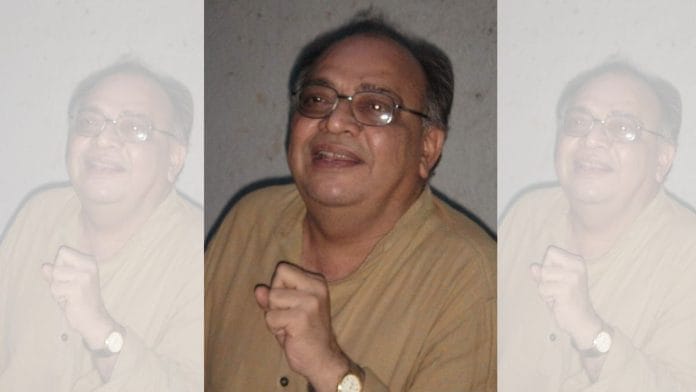Every time a journalist or researcher asked me for contacts in Ahmedabad, the first name that sprang to mind was Achyut Yagnik. I once joked that meeting him was like ringing a temple bell, an essential ritual to perform before entering the city.
I had heard of him long before I met him. He had worked with Gujarat Samachar and the Economic and Political Weekly, but left active journalism in the 1980s for other pursuits: co-ordinating the Lokayan Project for the Delhi-based Centre for the Study of Developing Societies (CSDS) and acting as the general secretary of the People’s Union for Civil Liberties (PUCL) in Gujarat among other things.
He had also co-authored a book, Creating a Nationality: The Ramjanmabhumi Movement and Fear of the Self, with Ashis Nandy and others (Oxford University Press, Delhi, 1995). He had been a Fellow of the United Nations University in Tokyo and lectured at universities abroad. His 2005 book The Shaping of Modern Gujarat was a crisp and masterful survey of his home state, co-authored with Suchitra Sheth.
I called him while visiting Ahmedabad in 2007 or thereabout to ask if I could pick his brains for a book I was thinking of writing on the city. He gave me directions to his office, mentioned a Digambar Jain institution as a landmark, added a few informative remarks about the significance of Jains in the city, and hung up with a chuckling “malshu” (we will meet).
I found him in his room on the first floor of a small building in a quiet leafy lane in downtown Navrangpura, which also housed his NGO, the Centre for Social Knowledge and Action (SETU). The large open room on the ground floor, abutted by a small pantry, was sparsely furnished with a table, some benches and long bookshelves.
Achyutbhai, ageless and calm as the Buddha, informed me that he was in the process of co-writing a book on the history of Ahmedabad to mark its 600th anniversary. I was taken aback but before I could respond, he made it abundantly clear that there was no reason for me not to do my book or for him not to help me.
A routine commenced. Every few weeks I would arrive by the Shatabdi from Mumbai and head to SETU. Over several strong cups of tea, we would chat. Achyutbhai would puff away at a cigarette and get up occasionally to point to a spot on the map of Gujarat behind him or to pull out a book, a bulky Gazetteer or some other reference work from a shelf.
Also read: Gujarati Dalit Kanjibhai Rathod was Bollywood’s 1st professional director, made 50+ silent films
A source of wisdom for researchers
A frequent visitor to the poor tribal areas of eastern Gujarat, he was also increasingly fascinated by urban migration and its effect on village life and on social mobility in the more developed regions of western Gujarat.
But perhaps that is my fancy. Reading early tributes from various people who had an intellectual relationship with him, I find that he connected with people according to their interest, finding in his deep reserves of knowledge and understanding the particular insight that was most likely to help the questing person before him.
And many had sat in the chair I occupied. “Peli/pelo aavyoto” (that person had come), he would say recalling some widely respected scholar who had visited Ahmedabad as a novice researcher and been helped quietly and unassumingly by Achyutbhai in all sorts of ways: with books, wisdom, a place to work and with introductions.
His office was an adda for a fascinatingly motley collection of people. If Gujarat was in the news for any reason, and it frequently was after 2002, the visiting cards left by parachuting media persons would form a small pile on his table. At any other time, one might meet researchers and writers visiting from distant places on the globe or from other parts of the country or from the city itself.
We talked about Gujarat and other things: national politics, the media, student organisations of the 1970s. Achyutbhai had lived much and known a great many people and could connect incidents and figures to form historical arcs. I wonder how he might have been as a young person filled with a reporter’s curiosity and an activist’s fiery angst. By the time I met him, he had acquired the stillness of a scholar.
Again, it may be my fancy because Achyut Yagnik never stopped fighting for causes that were dear to him. But I believe that writing helped sustain him as his beloved state erupted with violence and everything he believed in—social and economic justice and the rights of the vulnerable and the marginalised—came under attack in a market-driven majoritarian order. He put his energies into expanding his understanding of Gujarat’s history and society, providing a background against which to make sense from confusion.
If he lost heart in his later years, it seemed to me to be not so much from the political and social shifts he helped explain, but in response to the loss of qualities an older way of life had engendered: of conviviality, of a free exchange of ideas, of gathering, of connecting and the creation of value without expectation of material reward.
Amrita Shah is the author of Ahmedabad: A City in the World (Bloomsbury, 2015). She tweets @amritareach. Views are personal.






